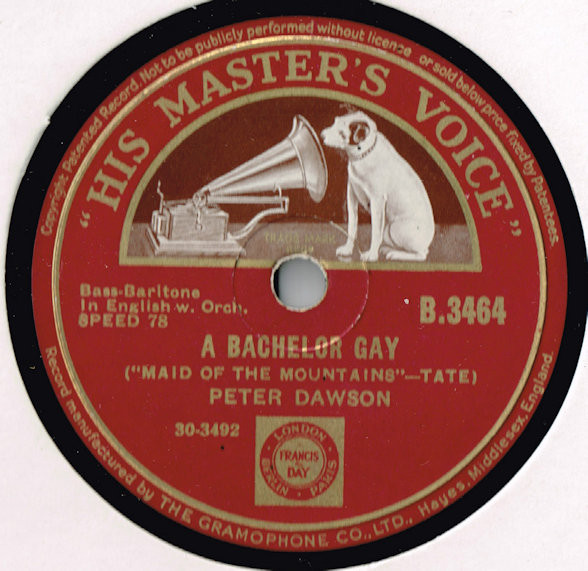Peter Dawson - A Bachelor Gay Vulcans Song
Table of Contents
Download
Filename: peter-dawson-a-bachelor-gay-vulcans-song.rar- MP3 size: 12.4 mb
- FLAC size: 87.4 mb
Tracks
| Track | Duration | Preview |
|---|---|---|
| A Bachelor Gay | ||
| Vulcan's Song |
Images

Catalog Numbers
B.3464Labels
His Master's VoiceListen online
- écouter en ligne
- lyssna på nätet
- ascolta in linea
- escuchar en línea
- kuunnella verkossa
- lytte på nettet
- online luisteren
- ouvir online
- online anhören
Formats
- Shellac
- 10"
- 78 RPM
Companies
| Role | Company |
|---|---|
| Manufactured By | The Gramophone Co. Ltd. |
| Published By | Francis Day |
Credits
| Role | Credit |
|---|---|
| Bass-Baritone Vocals | Peter Dawson |
Notes
Originally released in 1930 but this is a later pressing.About Peter Dawson
Australian bass-baritone and songwriter, born 31 January 1882 in Adelaide, Australia and died 27 September 1961 in Sydney, Australia.
From Australian Dictionary of Biography:
"Peter Smith Dawson (1882-1961), singer, was born on 31 January 1882 in Adelaide, youngest of nine children of Thomas Dawson, ironworker and plumber, and his wife Alison, née Miller. Peter attended the East Adelaide Primary School and Pulteney Street Grammar School, and was then apprenticed to his father. His parents encouraged his appreciation of music, and when 8 he sang as a boy soprano at a social at the College Park Congregational Church, St Peters, and was later in the St Andrew's Presbyterian Church choir. When 17 he began taking singing lessons from C. J. Stevens and sang at concerts with the Adelaide Grand Orchestra. In 1900 he was a soloist in their performance of Handel's Messiah, was successful in several local contests, and won the bass solo section at the South Street Competitions, Ballarat, Victoria. Next year he won an amateur boxing championship.
"In 1902, encouraged by Stevens, Dawson went to London and studied with B. L. Bamford, (Sir) Charles Santley, the eminent baritone, and Professor Kantorez. His first engagement was at a church in the East End for a fee of 7s. 6d. He was soon touring in the west of England with the popular concert and opera singer Madame Albani, and singing in London at the Crystal Palace and Queen's Hall promenade concerts. On 20 May 1905 he married Annie Mortimer Noble, a soprano with the stage name of Annette George. They had no children and often toured together internationally until a serious car accident ended her public career.
"In 1908 Dawson was principal baritone at the Chappell ballad concerts. Next year he sang in The Mastersingers of Nuremberg at Covent Garden and joined Amy Castles and her company in touring Australia. Back in London he extended his repertoire from ballads and operatic arias to include German lieder and French songs. Leading reviewers of his 1911 concerts agreed that he was the finest English baritone of the day. Dawson was in Australia during World War I; in 1918 he enlisted as a private in the Australian Imperial Force, but did not serve overseas.
"For all his success as a concert singer, the gramophone record made Dawson's a household name in many countries; he was one of the first artists to have faith in the process. In 1904 he made a test record for the Edison Bell Phonograph Co., and later in the year began his fifty-year career for His Master's Voice which spanned recording techniques from the two-minute cylinder to the long-playing disc and tape. His early record labels carried such pseudonyms as Frank Danby for light songs, Will Strong for music-hall ditties, and Hector Grant for Scottish songs. For Zonophone he used the names Arthur Walpole, Charles Hardy, Walter Wentworth and Robert Woodville. For some twenty years he was on a substantial annual retainer and did not receive royalties. His eventual total was more than 13 million sales of some 3500 titles. He came to see recording as 'the dominating success of his career'.
"Dawson composed many songs under such pseudonyms as J. P. McCall, Evelyn Byrd, Peter Allison, Denton Toms, Charles Weber, Arnold Flint, Gilbert Mundy, Geoffrey Baxter and Alison Miller. He set several of Rudyard Kipling's poems to music: Boots and Route Marching were among the most popular. In 1930-31 he topped the bill in variety at the London Palladium above many famous stars; it was often said that he could have been a professional comedian.
"In 1939-47 Dawson lived in Sydney. During the war he sang for the troops and on recruiting drives in Australia and New Zealand. He had plans to retire after the war, but he claimed his tax bills were so crippling that he had to keep singing. His peak earnings between the wars had been about £14,500 a year, but he was a 'hopeless businessman'. On 7 December 1950 he sang the bass solo role in the Messiah at the Adelaide Town Hall where he had sung the same part half a century before. In 1951 he published an autobiography Fifty Years of Song. As president of the Australian Songwriters and Composers' Association in 1953 he pressed for legislation to increase the compulsory radio time for local music. That year his wife 'Nan' died after a long illness. On 29 April 1954 he married her sister Constance Bedford Noble in Sydney. They lived at Dee Why where Dawson enjoyed painting, drawing cartoons and growing roses.
"Although Dawson loved the limelight, he remained unspoiled by fame, abhorred 'swank', and was never ashamed of the tattooed wrists that recorded his boyhood 'flames'. Survived by his wife, he died on 27 September 1961 in Sydney; after a funeral at St David's Presbyterian Church, Haberfield, he was buried in Rookwood cemetery. His estate was valued for probate at £1555."
Another pseudonym may be .
Real Name
- Peter Smith Dawson
Name Vars
- Albert-Peter Dawson
- Dawsom
- Dawson
- J.P. McCall
- McCall
- Messr. Peter Dawson
- Mr Peter Dawson And Orchestra
- Mr. Dawson
- Mr. P. Dawson
- Mr. Peter Dawson
- Peter Dawson (as McCall)
Aliases
- J.P. McCall
- Will Strong
- Charles Handy
- Hector Grant
- Robert Woodville
- George Welsh
Related albums

2003
1994
2012
2018
2013
1989
2011

1977
1969

2003
1991
1987
2007

1980
2014

2010
1995
2019